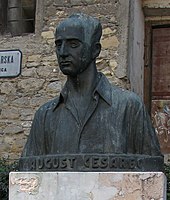August Cesarec
August Cesarec (born December 4, 1893 in Zagreb , Austria-Hungary ; † July 17, 1941 near Zagreb, Independent State of Croatia ) was a Serbo-Croatian-speaking writer, translator, publicist and politician who was executed at the age of 47 by the fascist puppet regime of the Independent State of Croatia has been. Along with Miroslav Krleža, Kindler's Neues Literaturlexikon counts the active communists “among the most important socially committed authors of Croatian literature between the world wars”. Cesarec's books are not yet available in German.
Life
Even the Zagreb student joined the nationalist forces that worked for the overthrow of the Danube Monarchy and an independent state for all southern Slavs. In 1912 Cesarec was sentenced to three years in prison for complicity in the murder of the imperial commissioner Slavko Cuvaj , but only had to serve two years. While in custody, he dealt with the writings of Stirner and Kropotkins , among other things . As a soldier in World War I, however, he warmed himself to the Russian Revolution and Marxism-Leninism. After the war he joined the young Communist Party (Yugoslavia). On behalf of the party he traveled frequently, including to Moscow and Republican Spain. Nonetheless, Cesarec always devoted himself to writing short stories and even a study of psychology (published 1932). He was already enthusiastic about literature as a teenager and founded the literary magazine Plamen (Flamme) together with Miroslav Krleža in 1919 , which, however, was soon banned. The rise of fascism pushed the party worker Cesarec underground. In March 1941, a few days before the invasion of the Axis powers , he was imprisoned with 90 other left-wing intellectuals in his country. After the invasion, the prisons were the new, pro-Hitler Ustasha taken regime. The Communist Party organized an escape from prisoners, but most of the refugees were recaptured and executed without further ado, Cesarec among them.
Honors
In the fourth largest city in Croatia Osijek is a street, in Zagreb's old town an entire district is named after August Cesarec.
Works
- Đački pokret , Zagreb 1912 (under the pseudonym Budislav Mirković)
- Stihovi , poems, Zagreb 1919
- Sudite me , Zagreb 1922
- Careva kraljevina , novel, 1925 (The Imperial Kingdom)
- Stjepan Radić i republika , Zagreb 1925
- Za novim putem , Zagreb 1926
- Zlatni mladić i njegove žrtve , novella, Koprivnica 1928
- Uskrs i smrt cara Lazara , story, 1928 (Resurrection and death of Prince Lazar)
- Tonkina jedina ljubav , short story, 1931 (Tonka's only love)
- Psihoanlazia i individualna psihologija , study, 1932 (Psychoanalysis and individual psychology ).
- Bjegunci , Zagreb 1933
- Današnja Rusija , Zagreb 1938 (under the pseudonym Vuk Korneli)
- Španjolski susreti , Toronto 1938
- Izraelov izlazak i druge legende , Zagreb 1938
- Novele , Zagreb 1939
- Putovanje po Sovjetskom Savezu , Zagreb 1940
- Na Ukrajini , Zagreb 1940
- Kod sovjetskih malih naroda , Zagreb 1940
- Sin domovine , Zagreb 1940
- Published posthumously
- Smijeh Jude Iškarijota , short story, Zagreb 1946
- Put u novi život , Zagreb 1947
- Slučaj kolportera Ferića , Zagreb 1949
- Legend i druge pripovijesti , Zagreb 1951
- Kći crne ruke - Ćuk u njenome duplju , Zagreb 1951
- Kriza stranke prava i naši 'komunari' 1871 , Zagreb 1951
- Majka božja bistrička , Roman, Zagreb 1955
- Izabrane pjesme , Zagreb 1961
- Izbor članaka , Belgrade 1962
- Svjetlost u mraku , Zagreb 1963
- Na posljednjim tračnicama , Zagreb 1963
- Eseji i putopisi , Zagreb-Belgrade-Sarajevo 1964
- Otkriće , Dramas and Fragments, Zagreb 1965
- AUGUST CESAREC I , Zagreb 1966
- Brodolom obitelji Rožman , Belgrade 1968
- Bijeli lutalac , Zagreb 1982
literature
- Ladislav Žimbrek: Knjizevna ostavstina August Cesarec , in: Republika 12/1953
- Marin Franicevic: August Cesarec , in: Republika 1/1962
- Mehmed Meša Selimović : August Cesarec , in: Zivot 3/1964
- Miroslav Krleža : August Cesarec , in: Forum 4/1965
- Vice Zaninovic: August Cesarec , Belgrade 1966
- Zorica Stipetic: Argumneti za revoluciju - August Cesarec , Zagreb 1982
Web links
Individual evidence
- ^ Edition Munich 1988
- ↑ According to Kindlers, this novel "from Cesarec 's expressionist creative period" takes place on just one day in 1912 in the Zagreb remand prison, but gives a (critical) sketch of the entire prewar period since 1900 of the Croatian Kingdom (dependent on Vienna and Budapest)
- ↑ This novella is about the proverbial "golden youth" of rich or otherwise favored offspring
- ↑ According to Mirjana Stančić, Wiesbaden, 1994, accessed April 15, 2011 , to Cesarec had in the 1920s under the influence Sperber of individual psychology approximated. Incidentally, this author thinks that Cesarec wrote “some of the most beautiful stories in Croatian literature”, including Careva kraljevina and Tonkina jedina ljubav .
| personal data | |
|---|---|
| SURNAME | Cesarec, August |
| BRIEF DESCRIPTION | Croatian writer, translator, publicist and politician |
| DATE OF BIRTH | 4th December 1893 |
| PLACE OF BIRTH | Zagreb |
| DATE OF DEATH | July 17, 1941 |
| Place of death | near Zagreb |
